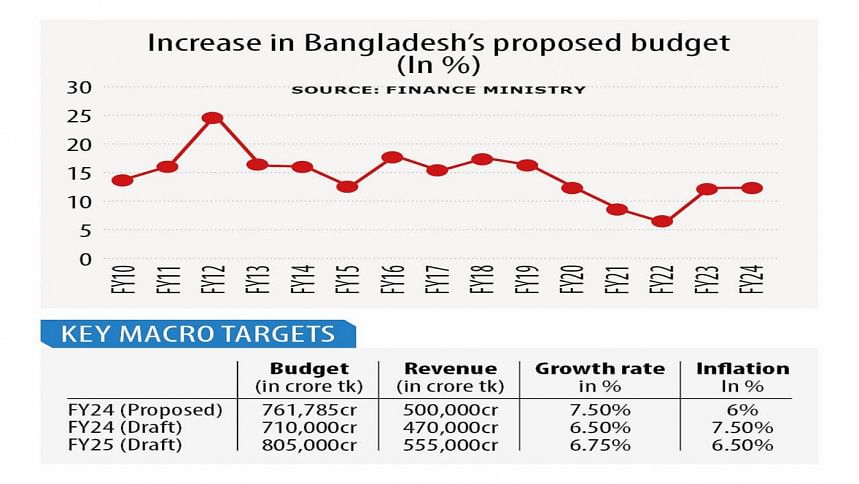Low revenue forces govt to scale back spending

The government plans to cut the size of the budget for the ongoing fiscal year and keep it slimmer in the next fiscal year in line with suggestions from the International Monetary Fund (IMF) and amid persisting macroeconomic challenges.
A meeting of the Fiscal Coordination Council yesterday, chaired by Finance Minister AHM Mustafa Kamal, came up with the plans for the revised budget for 2023-24 and the new ones in 2024-25.
Besides, the overall economic situation and the fiscal and monetary policies were discussed at the meeting, a finance ministry official said.
The council usually holds two to three meetings in a fiscal year. Yesterday's meeting was the first one of the body in FY24 and the last one before the parliamentary election scheduled January 7.
According to the draft layout, the budget size will be Tk 805,000 crore in FY25, which is around 6 percent higher than the ongoing budget of Tk 761,785 crore.
Historically, the government increased the size of a new budget by 12 to 13 percent from the outgoing one.
Similarly, the government is likely to cut the current budget by more than Tk 51,000 crore to Tk 710,000 crore.
Under the revised budget, the annual development programme will be Tk 245,000 crore, down from Tk 263,000 crore in the original budget.
The finance ministry official, who was present at the meeting, said the government has taken various austerity measures to deal with the economic turbulence amid lower revenue growth.
"The budget size for the current fiscal year could not be reduced to a large extent due to the huge pressure of subsidies and higher expenditures in the election year. However, government spending will be squeezed in FY25."
The IMF has suggested the government bring down expenditures.
It comes as revenue collections continue their slower trend in a country where the tax-to-GDP ratio is one of the lowest in the world, at around 9 percent.
The National Board of Revenue's collection growth stood at 12 percent in the first four months of FY24, which was 14 percent in the identical period of 2022-23.
The finance ministry official said the government's main objective in the next budget will be to control high inflation like in the current budget.
Headline inflation averaged 9.02 percent in FY23 – the highest in more than a decade -- and stood at 9.49 percent in November this year and shows no sign of cooling off since the factors responsible for the higher prices -- from the Russia-Ukraine war and higher global commodity prices to the significant depreciation of the local currency and market imperfections -- are still in play.
The government's target is to limit inflation to 6.5 percent in FY25. It is 6 percent for FY24 but is expected to be revised upwards to 7.5 percent.
The official said market monitoring will be enhanced and the open market sales of subsidised essentials by the Bangladesh Trading Corporation will be expanded.
The government will target a gross domestic product (GDP) growth of 6.75 percent in FY25 and is expected to revise it down to 6.5 percent from 7.5 percent in FY24 since almost all macroeconomic indicators are under pressure.
The higher GDP growth target was aimed despite the raging Russia-Ukraine war, the instability in the foreign exchange market and dwindling foreign currency reserves.
The official said the government will not entirely leave the exchange rate in the hands of the market. Rather, it will be made more market-oriented.
Besides, the existing interest rate-setting mechanism will continue in the next fiscal year. The efforts, however, will be there so that rates reflect market realities, he said.
In July, the central bank withdrew the lending rate cap and introduced a new interest rate-setting formula known as Six Months Moving Average Rate of Treasury Bills (SMART).
For FY25, the government will set a Tk 555,000 crore revenue generation target.
The target is Tk 500,000 crore for FY24 and it could be revised down to Tk 470,000 crore, the official said.

 For all latest news, follow The Daily Star's Google News channel.
For all latest news, follow The Daily Star's Google News channel. 



Comments